Related Research Articles

Olive Oyl is a cartoon character created by E. C. Segar in 1919 for his comic strip Thimble Theatre. The strip was later renamed Popeye after the sailor character that became the most popular member of the cast; however, Olive Oyl was a main character for a decade before Popeye's 1929 appearance.

Mae Questel was an American actress. She was best known for providing the voices for the animated characters Betty Boop, Olive Oyl and numerous others.
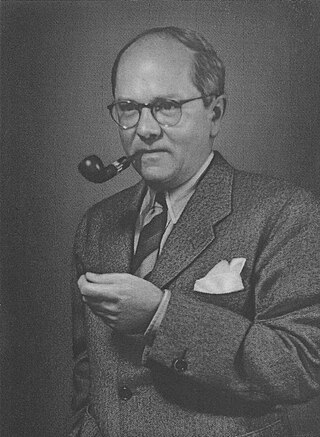
Richard Armstrong Whiting was an American composer of popular songs, including the standards "Hooray for Hollywood", "Ain't We Got Fun?" and "On the Good Ship Lollipop". He also wrote lyrics occasionally, and film scores most notably for the standard "She's Funny That Way".
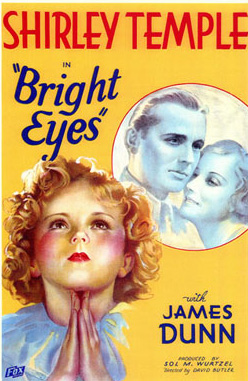
Bright Eyes is a 1934 American comedy drama film directed by David Butler. The screenplay by William Conselman is based on a story by David Butler and Edwin J. Burke.
"Sing, You Sinners" is a popular song with music by W. Franke Harling and lyrics by Sam Coslow. In 1930 it was used in the film Honey starring Lillian Roth. The Bing Crosby 1938 Paramount musical Sing You Sinners also included the song in the title credits.
"A Hundred Years from Today" is a popular song published in 1933 with music by Victor Young and lyrics by Ned Washington and Joe Young. The song was included in the London production of Lew Leslie's Blackbirds of 1934.
"Isle of Capri" is a popular song. The music, a tango foxtrot, was written by Wilhelm Grosz, with lyrics by Jimmy Kennedy and was published in 1934. Ray Noble and his Orchestra with vocalist Al Bowlly, recorded it in London, UK, on August 30, 1934. It was released in November on Victor Records in the United States, reaching number one for seven weeks in early 1935.

"Animal Crackers in My Soup" is a song introduced by Shirley Temple in the film Curly Top (1935). The lyrics were written by Josephine Drexel, Irving Caesar and Ted Koehler and the music by Ray Henderson; the sheet music was published by Sam Fox Publishing Company.

"By The Light of the Silvery Moon" or "By the Light of the Silv'ry Moon" is a popular love song. The music was written by Gus Edwards, and the lyrics by Edward Madden. The song was published in 1909 and first performed on stage by Lillian Lorraine in the Ziegfeld Follies of 1909. It was one of a series of moon-related Tin Pan Alley songs of the era. The song was also used in the short-lived Broadway show Miss Innocence when it was sung by Frances Farr.
"It Could Happen to You" is a popular standard with music by Jimmy Van Heusen and lyrics by Johnny Burke. The song was written in 1943 and was introduced by Dorothy Lamour in the Paramount musical comedy film And the Angels Sing (1944).
"Let's Fall in Love" is a song written by Harold Arlen (music) and Ted Koehler (lyrics) for the film Let's Fall in Love and published in 1933. In the film, it is heard during the opening credits and later sung by Art Jarrett and chorus, and by Ann Sothern.

"The Gold Diggers' Song " is a song from the 1933 Warner Bros. film Gold Diggers of 1933, sung in the opening sequence by Ginger Rogers and chorus. The entire song is never performed in the 1933 movie, though it introduces the film in the opening scene. Later in the movie, the tune is heard off stage in rehearsal as the director continues a discussion on camera about other matters.
"I Wished on the Moon" is a song composed by Ralph Rainger, with lyrics by Dorothy Parker. Bing Crosby sang the song in The Big Broadcast of 1936.
"The Lady's in Love with You" is a popular song which was written by Burton Lane (music) and by Frank Loesser (lyrics). The song was published in 1939 and introduced in the film "Some Like It Hot" (1939) when it was sung by Bob Hope and Shirley Ross. Ms Ross also sang it in the film with Gene Krupa and His Band. The song was sung by Tony Bennett at his final concerts, at Radio City Music Hall, in 2021.
"Mean to Me" is a popular song with music by Fred E. Ahlert and lyrics by Roy Turk, published in 1929. Hit versions that year were by Ruth Etting and by Helen Morgan. Ben Bernie and the Hotel Roosevelt Orchestra also recorded what might be the first male version in February 1929 with vocals by Scrappy Albert.
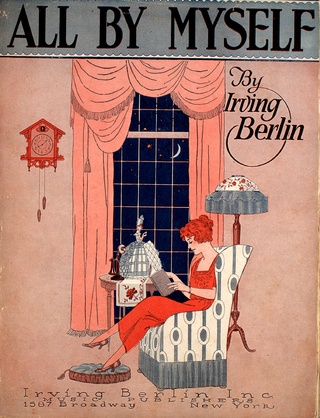
"All by Myself" is a popular song written by Irving Berlin, published in 1921.
"If I Should Lose You" is a song composed by Ralph Rainger, with lyrics by Leo Robin. It was introduced in the 1936 film Rose of the Rancho.
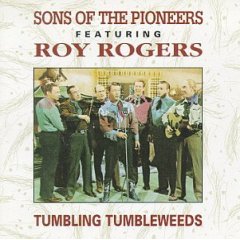
"Tumbling Tumbleweeds" is a Western music song composed by Bob Nolan, a founding member of the Sons of the Pioneers. Nolan wrote the song in the early 1930s while he was working as a caddy and living in Los Angeles. It was first recorded by the Sons of the Pioneers in 1934, and it became one of the most famous songs associated with the group. Originally titled "Tumbling Leaves", the song was reworked into the title "Tumbling Tumbleweeds" and into more widespread fame with the 1935 film of the same name starring Gene Autry. Members of the Western Writers of America chose it as one of the Top 100 Western songs of all time.
Liza (All the Clouds'll Roll Away)" is a song composed by George Gershwin with lyrics by Ira Gershwin and Gus Kahn. It was introduced in 1929 by Ruby Keeler (as Dixie Dugan) in Florenz Ziegfeld's musical Show Girl. The stage performances were accompanied by the Duke Ellington Orchestra. On the show's opening night in Boston on June 25, 1929, Keeler's husband and popular singer Al Jolson suddenly stood up from his seat in the third row and sang a chorus of the song, much to the surprise of the audience and Gershwin himself. Jolson recorded the song a few days later on July 6, 1929, and his rendition rose to number nine on the charts of the day.
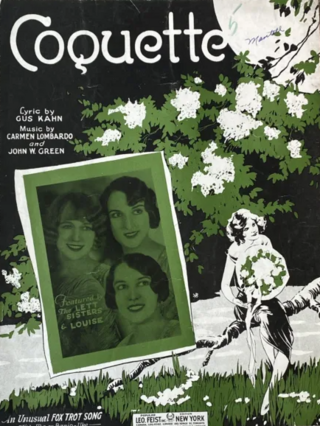
"Coquette" is a 1928 fox trot jazz standard. It was composed by Johnny Green and Carmen Lombardo, with lyrics by Gus Kahn. Guy Lombardo had great success with the song in 1928.
References
- ↑ "Shirley Temple Black, child star who became diplomat, dies at 85". Reuters. 11 February 2014. Retrieved 3 March 2014.
- ↑ Scott, Mike (11 February 2014). "Remembering Shirley Temple in song, from 'Good Ship Lollipop' to 'Animal Crackers in My Soup'". The Times-Picayune. Retrieved 3 March 2014.
- ↑ "5 films in which Shirley Temple shined - Washington Times". The Washington Times. 11 February 2014. Retrieved 3 March 2014.
- ↑ Curiously, in the film the floor of the airplane appears to be level, even though the DC-2 is a taildragger, and in real life it would be quite difficult to walk up and down the steeply sloped aisle while the plane is parked or taxiing.
- 1 2 Boyes, Laura. "Bright Eyes (1934)". Moviediva. Retrieved 3 March 2014.
- ↑ Lyman, Rick (8 January 1998). "Mae Questel, 89, Behind Betty Boop and Olive Oyl". The New York Times. p. 9. Retrieved 3 March 2014.
- ↑ "TV Picks – Treehouse of Horror". theboar.org. 20 November 2017. Retrieved 8 October 2020.
- ↑ "Season 11, Episode 20: Last Tap Dance in Springfield". hollywoodrevue.wordpress.com. 21 August 2016. Retrieved 8 October 2020.
- ↑ "The Online Discographical Project". 78discography.com. Retrieved February 19, 2018.
- ↑ Whitburn, Joel (1986). Joel Whitburn's Pop Memories 1890-1954 . Wisconsin, USA: Record Research Inc. p. 428. ISBN 0-89820-083-0.
- ↑ "The Online Discographical Project". 78discography.com. Retrieved February 19, 2018.
- ↑ Crossland, Ken (2013). late Life Jazz: The Life and Career of Rosemary Clooney. New York: Oxford University Press. p. 215. ISBN 978-0-19-979857-5.
- ↑ "Item Display - RPM - Library and Archives Canada". Collectionscanada.gc.ca. 16 August 1969. Retrieved 3 December 2019.